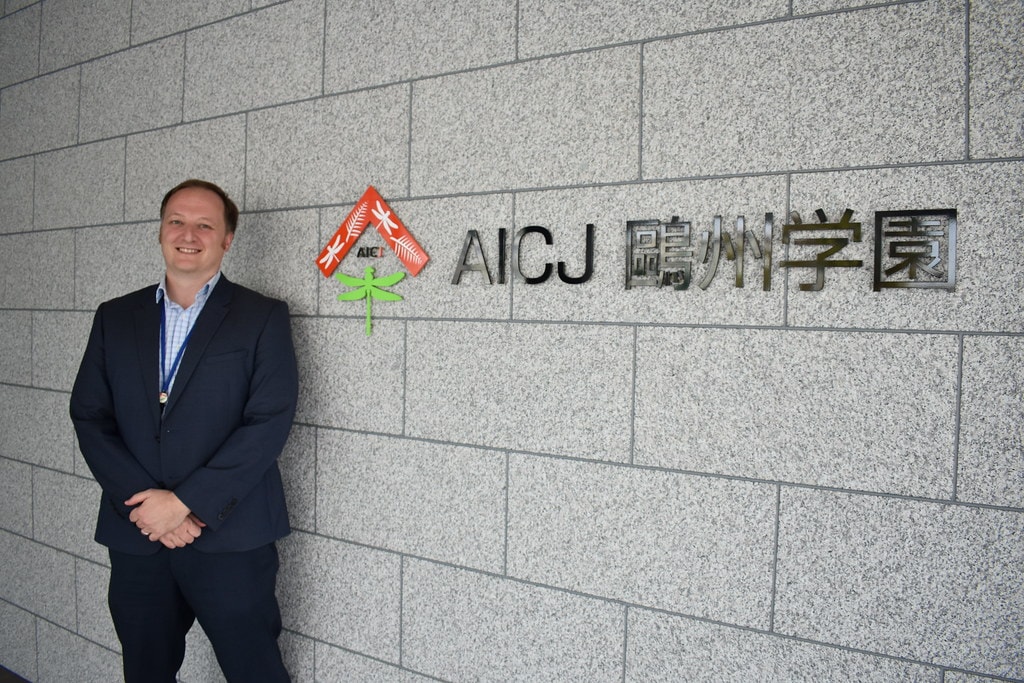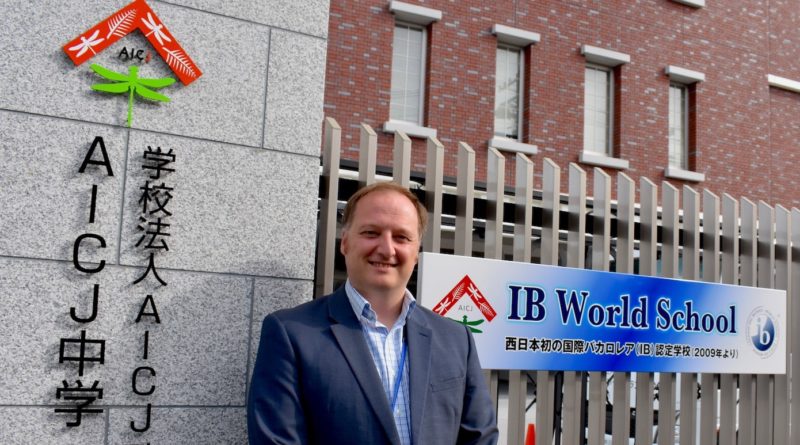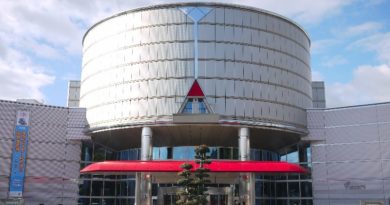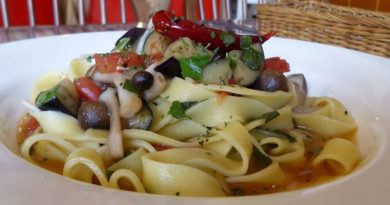AICJ Principal David Cooper
AICJ School in the Gion area of Asa-Minami-ku is a popular private school in Hiroshima with a strong focus on English and Japanese studies. It is one of two Hiroshima schools offering the International Baccalaureate (IB) program for high-school students.
I had the chance to sit down and talk with AICJ Principal David Cooper. David is originally from the UK and has been working at the school as a teacher since 2011. In 2012, he took on the role of AICJ school principal. David is passionate about creating a supportive atmosphere at the school where students feel good about coming to study each day. He has been at the school for more than eight years and says he feels invested in the success of the school and happy to stay for the rest of his career. David works in close collaboration with IB Coordinator Mr.Brown, who has also been at the school since 2011, and is in charge of the International Baccalaureate (IB) program.

Families of AICJ students who I have talked with appreciate the balance of the high-quality English and Japanese curriculum. English is not only taught in English language classes, but also used in courses like Math, Science, Music, and PE from the first year of JHS using a self-directed learning model more typical of western education models. The English curriculum is in addition to the standard Japanese national Junior and Senior High School curriculum requirements.
International parents at AICJ also appreciate the English support of the office staff and the English information that comes home alongside the Japanese information and announcements. In times of difficulty, there is a full-time translator in the office to assist with difficult paperwork or other complicated forms in Japanese. The application process, however, has to be completely done in Japanese which may be a challenge for some families. Additionally, entering the school without any Japanese comprehension can be challenging for students. David mentioned, however, that there have been success stories of motivated students who came to the school without Japanese ability and were able to work on their Japanese, with the support of staff, to be able to successfully complete their Japanese coursework.
The teachers are really focused on supporting students and helpful in assisting any students who need extra support outside classes to help them catch up on any subjects they are struggling with. The parent-teacher conferences are an example of the focus on self-directed learning principles. These parent-teacher conferences include the students and the teachers discuss the strengths and weaknesses with the student while the parent acts as a supportive observer. The focus is on the students to assess themselves and talk about ways they feel they can improve.
There are a lot of activities showcasing the school and providing students with extracurricular activities. The annual Sports Day is a fun event in a large indoor arena, the culture day showcases games, foods and activities created by the students in their classes, and the open-school day is a more formal opportunity for interested students and their families to observe AICJ classes.
Sports teams and other clubs are available for students to join which meet in classrooms, on one of the two fields on campus or in the school gym. David raved about the girl’s high-school football (soccer) team which is particularly strong and doing well in tournaments in Hiroshima with sights set on national tournaments in the future.
Currently, AICJ has a total of 635 students in the Junior and Senior High-School level with 65 students currently in the IB program. In 2019, there are currently around 60% boys and 40% girls at the school and the teaching staff is about 65% male and 35% female, there are 15 native-English speaking staff teaching full-time and 1 teacher part-time at the school from the UK, US, Phillippines, and Russia. There are half-year study-abroad programs in New Zealand and Canada for students in the 9th grade and a variety of shorter international summer programs for other grade students. These international study programs can really help them improve their self-confidence as well as English skills before entering the high-school.
A key indicator of how successful the school has become is to look at how difficult it is to enter. AICJ has become a highly competitive school to get into, accepting about 30-40% of all applicants with some courses being more competitive to get into than others.
The IB program is particularly competitive accepting only 20 students from the 115 applicants for the 2019 enrollment year. Most students who graduate from the IB program choose to enroll in International Departments at a variety of Japanese universities. When applying for Japanese universities, many students are successful in being accepted during the early admissions (AO) period. Every year, there are also 5-10 IB graduates of AICJ who are accepted to international universities outside of Japan. AICJ graduates have been accepted to a variety of universities in America, Canada, the UK, Europe, Australia, and New Zealand.
AICJ originally opened its doors in 2006, but the facilities have recently been renovated as the school moved into a new Western-style building in 2016.
In terms of future goals, David Cooper says he would like to see the IB program grow to support more students who want to enter this challenging international high-school standard in Japan. AICJ has students enroll from all over Japan each year which makes the boarding facilities for both boys and girls popular with families sending students from outside Hiroshima, some from as far away as Tokyo or Hokkaido.
If you are interested in learning more about the school or coming for a visit, David recommends getting in touch soon via the website or main office to arrange a visit.
- AICJ Junior and Senior High School
3 Chome-1-15 Gion, Asaminami Ward, Hiroshima, 731-0138
Telephone: 082-832-5037Website: http://aicj.ed.jp/
—————————-
You may also be interested to read about the interview with Damian Rentoule, Principal of Hiroshima International School (HIS) – another private international school in Hiroshima offering the IB program.




